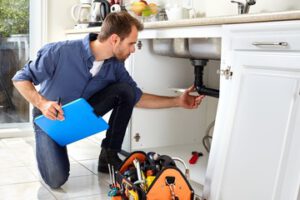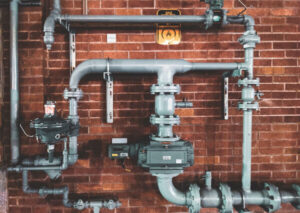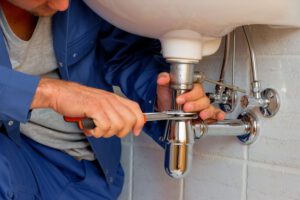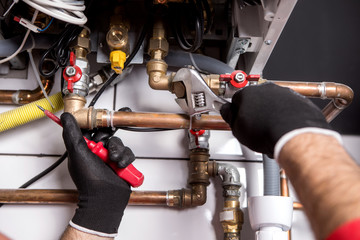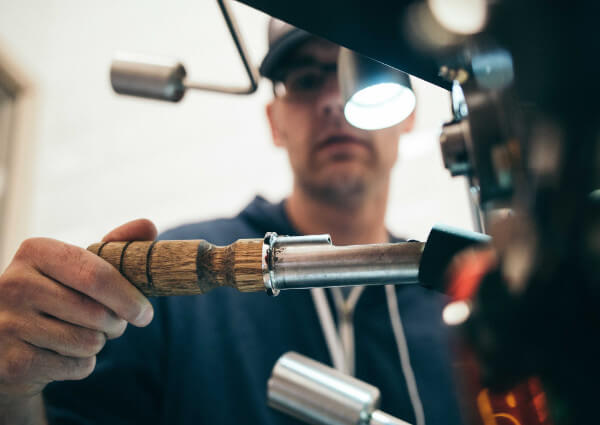When your home is flooded, or there is an issue with your pipes, it’s crucial to find a 24-hour plumber near you immediately. But before you call, vet the professional to ensure they’re trustworthy and will perform quality work.
You should also check out their fees and what’s included in their service. You can also ask around for recommendations. For professional help, contact Plumbers Topeka.
There are some plumbing issues that must be dealt with immediately. This includes a burst pipe, extensive water damage, or sewage backup. Emergency plumbers are available throughout the day and on weekends to address these problems. They are trained in safety procedures and can quickly evaluate the situation to determine the best course of action. This will minimize the damage and prevent further complications in the future.
A flooded bathroom can cause significant water damage to your home and may also lead to mold growth. An emergency plumber will be able to turn off your water supply and make the necessary repairs to avoid further damage. They will also be able to help you restore any belongings that have been affected by the flooding.
Leaking pipes can also lead to costly water damage if left unattended. An emergency plumber will be able to locate the source of the leak and make the necessary repairs. They will also be able to advise you on how to prevent the problem from recurring in the future.
Other plumbing emergencies that require immediate attention include a gas leak, a sewer backup, or a blocked drain. These problems can be extremely dangerous for you and your family. An emergency plumber will be able to fix these problems in a safe and timely manner.
A hot water heater is another issue that requires immediate attention. If you are unable to get hot water from your taps, this is a clear sign that there is something wrong with your water heater. Emergency plumbers will be able to resolve the issue and help you choose a new one if needed.
When choosing an emergency plumber, make sure to check their credentials and customer reviews. This will ensure that you are getting the highest quality service possible. You should also ask about their experience and whether they have worked on similar projects to yours. Ideally, you should find a plumber who has experience working on both residential and commercial properties. In addition, it is important to ask about their rates and what extra charges they might apply for night or weekend work.
High Prices
Plumbing emergencies can escalate into major disasters if they’re not dealt with promptly. For example, a simple water heater leak may lead to extensive damage if left unattended. An emergency plumber will be able to provide a quick and effective fix, which can prevent further damage and save you money in the long run.
A reputable emergency plumber will have all the tools and equipment needed to perform a quality job. They will also have the knowledge and expertise to ensure that the repairs are made correctly and efficiently. In addition, emergency plumbers will be familiar with local building codes and regulations, which means that the work will be done in accordance with industry standards.
However, hiring an emergency plumber can be expensive. These professionals are available 24/7 and will often charge higher rates than regular plumbers. Additionally, they may charge extra fees for working after hours or on weekends and holidays. Therefore, it’s important to research different companies and compare prices before choosing one.
Another factor that influences the cost of emergency plumbing services is the location. Plumbers living in urban areas tend to charge more than those who live in rural locations, due to the higher cost of living. This is especially true for master plumbers, who have advanced skills and can handle more complex jobs.
Finally, it’s important to remember that emergency plumbers aren’t just for emergencies. They can also be hired to perform routine maintenance and repairs. In fact, many plumbers offer a maintenance plan that includes monthly visits for routine inspections and troubleshooting. This can help homeowners avoid expensive repair bills in the future and keep their home’s plumbing system in good working condition.
In addition, emergency plumbers can be hired to install new appliances and fixtures, including faucets, toilets, showers, and drains. They can also handle water heater installation and replacements. Additionally, they can provide maintenance services for gas and oil-powered heating systems. Finally, emergency plumbers can be hired to help with sewer line repairs and backups. These professionals can also handle gas pipe installation and repair, as well as re-route sewer lines.
Safety
Emergency plumbing services are available to help with a wide range of problems, including leaky pipes, toilets that overflow or back up, and water heaters that break down. These plumbers are trained to handle these situations quickly and efficiently, minimizing damage and ensuring the safety of their customers. However, they often charge higher prices than other plumbers because of their limited availability and emergency nature. To save money on these services, you can take several steps to prevent problems from occurring in the first place.
If you experience a plumbing problem, it’s important to know what to look for so that you can call an emergency plumber in Sheboygan or Plymouth as soon as possible. Some signs of a plumbing emergency include a sudden increase in your water bill, suspicious stains on walls or ceilings, and damp spots in unusual places. You may also hear running water when the faucets are turned off. These are all signs of a water leak that needs to be fixed immediately.
To limit the amount of water damage, turn off the water supply valve on your home’s main line. This is usually located in the basement or near your water meter. You can also try to save as much furniture and other belongings as you can from water damage by removing them from the affected area. It’s also a good idea to remove children and pets from the area until the plumber arrives.
In addition to water damage, a broken toilet or sink can lead to health problems. If the toilet overflows, it can cause a serious mess and mold growth. You can avoid this by turning off the water supply to your toilet before calling a plumber. You can also use towels, rags, and heavy-duty paper towels to soak up as much water as possible until the plumber arrives. If you’re concerned about health risks, you can always ask the plumber to run a test for gas leaks before they start working in your home. These tests are usually quick and inexpensive, and they can save you from a lot of trouble in the future.
Efficiency
Emergency plumbing issues can range from burst pipes to clogged drains, and they can be incredibly difficult to deal with. Professional plumbers are trained to repair and replace plumbing components quickly and efficiently, and they can help you minimize damage to your property while addressing the issue. They also have the experience and expertise to solve the problem once and for all. In addition, they can also provide you with valuable advice and tips that will prevent the issue from reoccurring in the future.
When choosing an emergency plumber, be sure to ask friends and neighbors for recommendations and read reviews online. Look for plumbers who have high customer satisfaction ratings and are licensed. Also, make sure to find out how long they have been in business. A reputable emergency plumber will be dedicated to providing quality service and will use only the best materials for repairs.
Getting a reliable 24-hour plumber can save you from a lot of stress and money in the long run. They will be able to respond to your call immediately and fix the issue before it gets worse. They can also assist you with other home maintenance tasks, such as cleaning sewer lines and preventing water leaks.
Plumbing emergencies are unavoidable, and you should always be prepared for them. A faulty toilet or leaky faucet can lead to serious water damage in your home, and the resulting costs can be very expensive. In most cases, the best thing you can do is to contact an emergency plumber as soon as you notice a problem. They will be able to diagnose and repair the issue as soon as possible, so you can avoid costly repairs in the future.
Unlike regular plumbers, emergency plumbers are available 24/7 and can be called at any time of the day or night. Moreover, they are willing to work during holidays and weekends. They can even come out in the middle of the night to resolve your plumbing problems. Besides, emergency plumbers are very efficient and will arrive at your place within an hour of the call.

